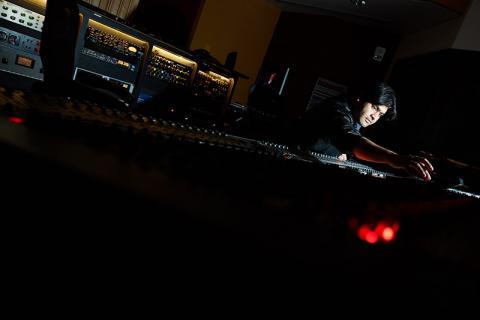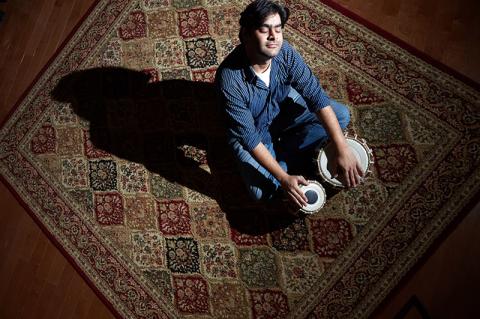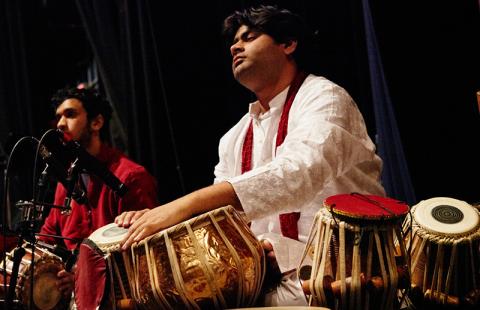Berklee's Kaushlesh Purohit Aims to Advance Audio in India

Music production and engineering student Kaushlesh Purohit at a Berklee recording studio console
Photo by Kelly Davidson

Purohit plays tabla in the Ark, a recording studio at Berklee.
Photo by Kelly Davidson

Purohit performs live with Clinton Cerejo and the Berklee Indian Ensemble.
Photo by Dave Green
Growing up in Jodhpur, the second-largest city in the Indian state of Rajasthan, Kaushlesh Purohit was inspired by the music of the prolific composer and performer A. R. Rahman H’14, after whom Berklee has recently named a scholarship. Purohit, now a sixth-semester student who applied for and was accepted into the music production and engineering (MP&E) major at Berklee, says the Grammy- and Academy award-winning Rahman “changed [his] vision of what good music is.” Recently, Purohit was tasked with mixing the sound for a video highlighting songs from the A. R. Rahman Meets Berklee concert at Symphony Hall in Boston last fall—a dream assignment for Purohit.
“Every day, I would open up that hard drive and that ProTools session and I’d see, ‘A. R. Rahman Meets Berklee,’ and I’d think, man, when I started, I never would have thought that I’d be mixing A. R. Rahman’s music,” Purohit says. “It was an electrifying feeling. My mom was also really proud.”
Watch the A. R. Rahman concert video featuring Purohit’s sound mixing work:
The Road Almost Taken
That electrifying feeling almost didn’t materialize for Purohit, who was on track to embark on a career in computer science engineering after graduating from Rajasthan Technical University. Purohit’s father signed him up for harmonium and voice classes at age 10 and he added tabla to his repertoire soon after that. From these early roots in music, perhaps it’s not surprising that, even as he studied computer science, music kept sprouting into his life. After finishing his homework, Purohit spent his nights creating electronic music.
A turning point came when Purohit visited Bangalore to get a closer look at people making their way in the computer science field. Not convinced that path was right for him, Purohit instead began working for his uncle’s event management company, a job that included stage management and which afforded Purohit an opportunity to ask questions of the live sound professionals with whom he worked. Meanwhile, he jammed with friends, one of whom happened to buy a poster of John Mayer one day.
Purohit says he asked his friend, “Where do these people come from? Where do they study?”
The answer was Berklee.
A Home Away from Home
Although far from home as a student on Berklee’s Boston campus, Purohit found kinship from day one in the Berklee Indian Ensemble. In his first year at Berklee, Purohit joined the ensemble in a concert with popular singer and producer Clinton Cerejo. Purohit sang with Cerejo and played tabla, bhapang (a single-string instrument played by striking the string while adjusting the tension), and khartal (a percussion instrument of the local folk tradition of Rajasthan).
Watch Cerejo perform with Purohit and Berklee Indian Ensemble students:
“The Berklee Indian Ensemble is a family,” Purohit says, adding that the group’s extensive rehearsal schedule looks like a lot of work on paper but doesn’t feel like toil during the rehearsal process. “The best part is that you can be you in that ensemble. If you’re not having fun, you’re not there.”
"From day one, I’ve had an amazing experience," Purohit says. "I met Annette Philip," [voice instructor and Indian Ensemble director], "who is a beautiful soul who knows how to achieve what she wants; everybody respects her because she loves everybody so much. I met Clint Valladares [cofounder of the Berklee India Exchange and director of operations and outreach for Berklee City Music National], who is an amazing guy. I met Prince Charles Alexander, Alejandro Rodriguez, and Mike Denneen in the MP&E department and they have so much knowledge and passion for their work, it’s amazing.”
At Berklee, Purohit has also made a significant impact on the tabla curriculum while learning about tabla theory from Jerry Leake, associate professor of percussion. While Berklee has had tabla players before, Purohit is the first to declare tabla as his principal instrument and to take all of his proficiency exams on the tabla.
“It’s not like ‘tabla curriculum by Kaushlesh,’” Purohit says, “but I’ve helped define a basis for how to examine future tabla players that may come here.”
Fostering World-Class Audio in India
While he still plays tabla, as an MP&E major, Purohit’s focus has shifted from performance to recording and mixing. His goal is to absorb as much knowledge as he can in order to help advance music in India, particularly in regard to audio quality.
He obtained some hands-on training via his work on the A. R. Rahman concert video, a mammoth task requiring several 14-hour days, given that the three-hour concert featured 108 audio tracks. Calling on his event management background, Purohit had also played a key role in organizing the concert, but with the utmost candor, he acknowledges that he had “no clue” how to handle a mixing project of this scope.
“But Annette was confident in me,” he says. “She knew that I knew the music and that even if I didn’t have the experience, I would eventually figure it out and do this thing. Her confidence in me gave me the strength to think, ‘Okay, I can do this.’”
And so, he did. Now, emboldened by this experience, he’s starting to set his sights on his post-Berklee goals, which are expansive.
“There is a lot of music in India that is amazing,” says Purohit, “but a lot of it doesn’t sound good because it’s not recorded or processed nicely. A lot of the big Bollywood productions in India get mixed overseas. I want to teach people what I’m learning so that they don’t have to send it overseas, and I want any project I’m associated with in India to have world-class audio.”
It’s no small ambition, but Purohit appears to have the drive to achieve it.
